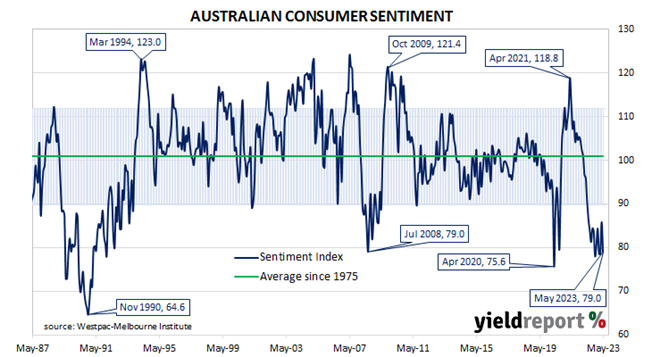Summary: Household sentiment deteriorates in May; back to just above the dismal levels; 60% of fall attributable to May budget, remaining 40% to RBA increase and other factors; all five sub-indices lower; more respondents expecting higher jobless rate.
After a lengthy divergence between measures of consumer sentiment and business confidence in Australia which began in 2014, confidence readings of the two sectors converged again in mid-July 2018. Both measures then deteriorated gradually in trend terms, with consumer confidence leading the way. Household sentiment fell off a cliff in April 2020 but, after a few months of to-ing and fro-ing, it then staged a full recovery. However, consumer sentiment has deteriorated significantly over the past year, while business sentiment has been more robust.
According to the latest Westpac-Melbourne Institute survey conducted in the week before Easter, household sentiment has deteriorated and is at a level which is very depressed. Their Consumer Sentiment Index decreased from April’s reading of 85.8 to 79.0, a reading which is well below the “normal” range and significantly lower than the long-term average reading of just over 101.
“The Index has fallen back to just above the dismal levels seen back in March, which recorded the lowest monthly read since the COVID outbreak in 2020 and, before that, since the deep recession of the early 1990s,” said Westpac Chief Economist Bill Evans.
Any reading of the Consumer Sentiment Index below 100 indicates the number of consumers who are pessimistic is greater than the number of consumers who are optimistic.
Commonwealth Government bond yields fell modestly on the day. By the close of business, the 3-year ACGB yield had slipped 1bp to 3.09% while 10-year and 20-year yields both finished 2bps lower at 3.41% and 3.87% respectively.
In the cash futures market, expectations regarding rate cuts in 2024 softened slightly. At the end of the day, contracts implied the cash rate would remain essentially steady at the current rate of 3.82% to average 3.845% in June and 3.895% in July. February 2024 contracts implied a 3.695% average cash rate while May 2024 contracts implied 3.49%, 33bps less than the current rate.
Evans noted a big difference between respondents surveyed before the Budget and those surveyed afterwards. “Sentiment amongst those surveyed before the Budget announcement showed an index read of 81.3, down 5.3% compared to April. Sentiment amongst those surveyed after the announcement came in at 75.3, down an additional 7.4%. A strict interpretation would attribute about 60% of the May fall to the Federal budget and the remaining 40% to the interest rate decision and other factors.”
All five sub-indices registered lower readings, with the “Family finances – next 12 months” sub-index posting the largest monthly percentage loss.
The Unemployment Expectations index, formerly a useful guide to RBA rate changes, rose from 118.9 to 123.2. Higher readings result from more respondents expecting a higher unemployment rate in the year ahead.



